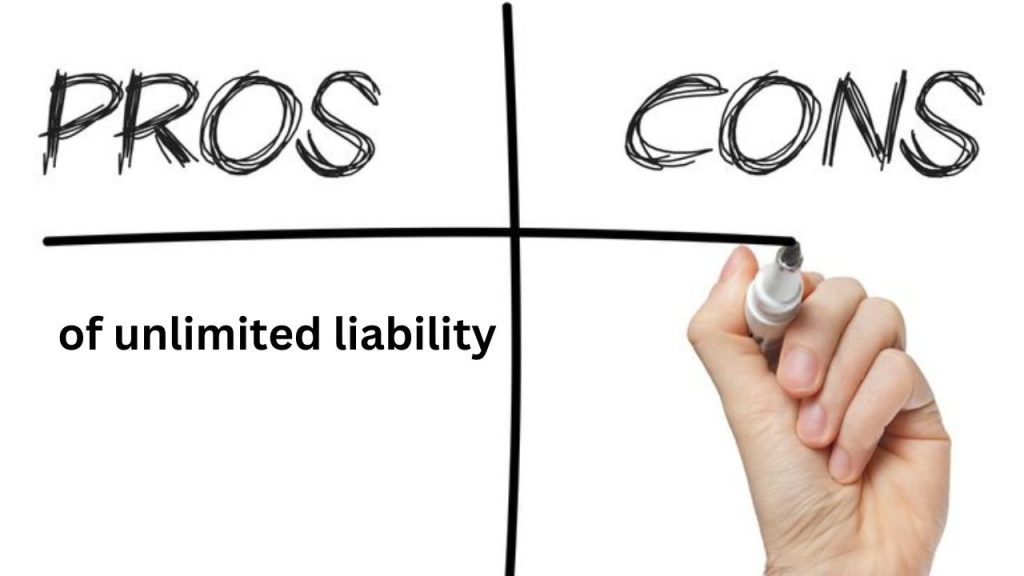Are you excited to explore the interesting business world, where chances for success and risks come together in a dance of possible rewards and challenges? Imagine a puzzle piece called Unlimited Liability in Business that holds a special secret. It’s like a magic key that can either help a business succeed or cause problems suddenly. Whether you’re a business expert or new to the business world, knowing about this important idea is like having a unique map to find your way through the twists and turns of business. So, let’s start by discussing what Unlimited Liability in Business means.
Unlimited liability is about more than just handling problems. It’s like showing how much you believe in your idea. It’s about people who take a brave chance by using their things to make their fantastic idea work. They know that even though it’s risky, there’s a chance for big success that can make their dreams come true.
What Is the Meaning of Unlimited Liability?

Unlimited liability is a legal and financial concept where business owners or partners are personally responsible for all the debts and responsibilities of the business. In simple terms, if the company can’t pay its debts, the owner’s personal belongings, apart from what they put into the business, can be used to pay off the debts. This means the owners are fully responsible for business losses and legal issues.
Unlimited liability is commonly linked with certain business types like sole proprietorships and general partnerships. There’s no legal separation between the business and its owners in these setups. So, the owners’ things can be taken by creditors if the company struggles financially. This includes savings, property, and valuable possessions.
Choosing between unlimited and limited liability depends on factors like business size, industry, risk level, and how much risk the owners are comfortable with. Many business owners go for limited liability to keep their things safe from the ups and downs of business.
The following are examples of unlimited liability

Here are some examples of unlimited liability:
- Sole Proprietorship: In a sole proprietorship, the business owner and the business are considered the same legal entity. Therefore, the owner has unlimited liability for any business debts or legal obligations.
- General Partnership: In a general partnership, each partner is equally liable for the debts and commitments of the company. If the partnership has financial issues, each partner’s assets could be at stake.
- Some Limited Partnerships (LPs): While limited partners in an LP typically have limited liability, the general partner(s) have unlimited liability. The general partner(s) manage the LP and are liable for its debts and obligations.
- Sole Trader or Self-Employed Professionals: Individuals who work as self-employed professionals, such as doctors, lawyers, or consultants, may have unlimited liability if they are personally liable for malpractice claims or debts arising from their professional activities.
What Are the Pros and Cons of Unlimited Liability?

Many businesses opt for limited liability structures (like limited liability companies or corporations) to mitigate some of these risks and drawbacks. Here are the pros and cons of unlimited liability:
Pros
Simplicity and Flexibility: Unlimited liability business structures are relatively simple and easy to set up, requiring fewer legal formalities than other business entities like corporations. This simplicity can be advantageous for small businesses or startups with limited resources.
- Direct Control: Owners or partners directly control the business’s operations and decision-making. There are no complex governance structures or multiple layers of management.
- Incentive for Prudent Management: Since the owners’ assets are at risk, they are motivated to manage the business more carefully and make sound financial decisions. As a result, risk management and evaluation could improve.
- Lower Borrowing Costs: In some cases, lenders might be more willing to extend credit to businesses with unlimited liability because the owners’ assets are on the line. This can lead to lower borrowing costs or better access to credit.
Cons
- Personal Financial Risk: The most significant disadvantage of unlimited liability is that owners’ assets, including their savings, property, and other possessions, are at risk in case of business failure or substantial debt. If the company has financial issues, this could result in the owners’ financial devastation.
- Limited Growth and Investment: Unlimited liability structures might deter potential investors or partners from joining the business, as they could be unwilling to assume the same level of personal risk. This can limit the business’s ability to attract capital for growth and expansion.
- Difficulty in Attracting Talent: Offering ownership stakes in a business with unlimited liability may not be attractive for talented employees, as they would also be exposed to personal financial risk.
- Lack of Separation: Unlimited liability structures do not provide a clear legal separation between the business and its owners. This can make it harder to protect personal assets from business-related liabilities.
- Limited Tax Benefits: Unlike other business entities, unlimited liability structures may not provide the same tax benefits or deductions that can help reduce the business’s and its owners’ overall tax liability.
Difference Between Limited and Unlimited Liability

Limited and unlimited liability refers to the extent of financial responsibility owners or investors have in a business entity. These terms are particularly relevant in the context of partnerships and corporations. Here’s a breakdown of the differences between limited and unlimited liability:
Limited Liability
A legal principle known as limited liability states that a business entity’s owners or shareholders are not held personally liable for any debts or liabilities that the firm incurs above and above the value of their investment. This means that if the business incurs financial losses or faces legal liabilities, the personal assets of the owners or shareholders are generally protected. Their weakness is limited to how much money they have invested in the business.
Unlimited Liability
The opposite of limited liability is unlimited responsibility, which states that a company’s partners or owners are personally liable for all of the company’s debts and obligations, regardless of whether such responsibilities are greater than the value of their investment. If the industry faces financial difficulties, creditors can go after the owner’s assets to settle the business’s obligations.
Conclusion
Unlimited liability in business is like a mighty double-edged sword, embodying courage and risk. It signifies the unwavering belief of entrepreneurs in their ventures as they stake their personal belongings to make their dreams a reality. This concept, closely associated with business forms like sole proprietorships and general partnerships, holds the potential for great success yet exposes owners to substantial personal risk.
While offering simplicity, control, and a strong incentive for careful management, unlimited liability also brings the shadow of financial peril, limited growth potential, and challenges in attracting partners and talent. In contrast, limited liability shields owners from safeguarding their assets up to their invested amount. The distinction between these two liabilities is a pivotal factor shaping the course and fate of businesses, reflecting the intricate dance between risk and reward in the dynamic world of entrepreneurship.




